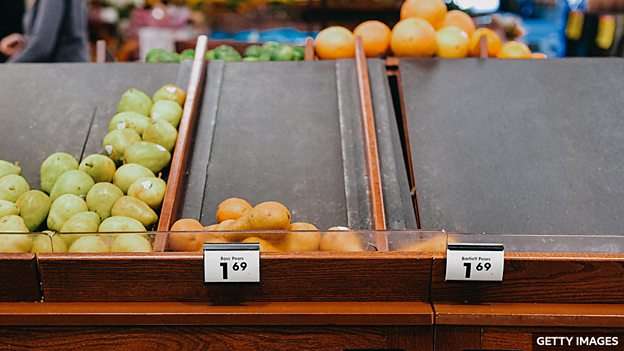内容简介
一位听众来信询问 “sell out” 在表示 “卖完了,卖光了” 这个意思时,使用主动语态还是被动语态更常用。听本期 “你问我答” 节目讲解固定搭配 “sell out” 的用法,以及相关名词 “sellout” 的具体含义。
文字稿
(关于台词的备注: 请注意这不是广播节目的逐字稿件。本文稿可能没有体现录制、编辑过程中对节目做出的改变。)
Buli
大家好,欢迎收听 BBC 英语教学的 “你问我答” 节目。 I'm Buli.
Phil
And I'm Phil. We have a question from one of our listeners.
Question
您好,请问用 “sell out” 表示 “卖完” 时,主动语态和被动语态哪个更常用?比如:“The books have sold out.” 或 “The books have been sold out.” 谢谢!
Phil
This is a great question to look at because we can use 'sell out' in different ways. Firstly, I can say that it is common and accurate to use 'sell out' in the active voice.
Buli
这个问题中提到的用法 “sell out” 在表达 “卖完” 这个意思时,使用主动语态是最为准确的。但在使用这个短语时,我们可以通过搭配不同的主语来让句式更加具体和丰富。比如,我们可以说 “卖东西的人或公司卖完了自己的产品 sell out of something”。
Phil
When we use it like this, we mean that the person or business doesn't have any stock left of the particular item. Listen to these examples.
Examples
Sorry, we sold out of bread hours ago – there's none left.
(抱歉,我们好几个小时之前就把面包卖完了,一个都没剩下。)
I went to buy tickets for the concert, but the booking office had sold out of them already. We'll have to do something else!
(我去买音乐会的票,但售票处已经把票卖完了。我们只能做些别的事情了!)
Phil
In those examples 'we' and the 'booking office' were the people and businesses that had sold out of something, and 'tickets' and 'bread' are the objects of the verb 'sell out'.
Buli
是的,上面的例句中 “sell out” 的主语都是卖东西的人或公司,这时我们就可以使用句式 “… sell out of …” 来表达 “某人把某物卖完了” 这个意思。在这个句子中,被卖完的东西作宾语。除此之外,我们还可以用被卖完的东西做句子的主语,同样可以表达出 “某样东西被卖光了”。来听接下来的例句。
Examples
Everyone knows it's the best in the city, so our bread always sells out quickly.
(大家都知道我们的面包是城里最好的,所以总是很快就卖光了。)
I'm afraid the tickets sold out in minutes. We don't have any to sell you.
(很抱歉门票几分钟之内就卖完了。我们没有能卖给你的了。)
Phil
Here, 'bread' and 'tickets' are the subjects of the verb 'sell out' – but the meaning is the same. There's no bread, and there are no tickets left. These are all active uses of 'sell out'.
Buli
我们可以注意到,以上 “sell out” 的两种用法中,它都是以主动语态出现。而它的过去分词形式 “sold out” 在被动语态中使用时,实际上承担得作用更接近于形容词而非动词。比如:“The concert is sold out. 音乐会已经没票了。”
Phil
If we describe something as 'sold out', then it just means that there is no stock of that thing remaining. If we describe an event as 'sold out', then it means that there are no tickets left. And if you describe a shop or business as 'sold out', it means that they have nothing left. Listen to these examples.
Examples
We wanted to buy a copy of that book, but it was sold out in every shop we went in.
(我们想买那本书,但我们去的每一家店都把那本书卖光了。)
The noodle stand was sold out by half past one. It's been incredibly popular.
(才过一点半这家面条铺子的面就卖光了。这家铺子生意特别火。)
Buli
从上面的例子我们可以看出,“sold out” 不但可以用来形容 “被卖完的东西”,也可以用来形容 “卖完某样东西的生意、店铺等,或者是需要门票才能参加的活动或演出”。
Phil
We can also use 'sellout' as a noun – this is an event for which all the tickets have been sold.
Buli
我们还可以去掉 “sell out” 中的空格,使其变为名词 “sellout”,意思是 “门票或入场券被卖光了的某个活动或演出”。来听两个例句。
Examples
This new play is a complete sellout. It's a huge success!
(这部新剧的票被一抢而空。真是巨大的成功!)
Everyone wants to see this team. The last three games have all been sellouts.
(所有人都想看这支队伍的比赛。他们最近的三场比赛的票都销售一空。)
Buli
那么最后,让我们复习一下本期节目的内容。在使用 “sell out” 表达 “某样东西卖完了” 这个意思时,通常使用主动语态。但我们也可以用它的过去分词形式 “sold out” 来形容 “某样东西卖光了”,或使用名词 “sellout” 来指代 “某个很受欢迎,票被卖光了的活动或演出”。
Phil
Hopefully, we've answered your question. If you have a question that you'd like us to answer, you can email us too at: questions.chinaelt@bbc.co.uk
Buli
你也可以通过新浪微博向我们提问,我们的微博账号是 “BBC英语教学”。Bye!
Phil
Bye!

